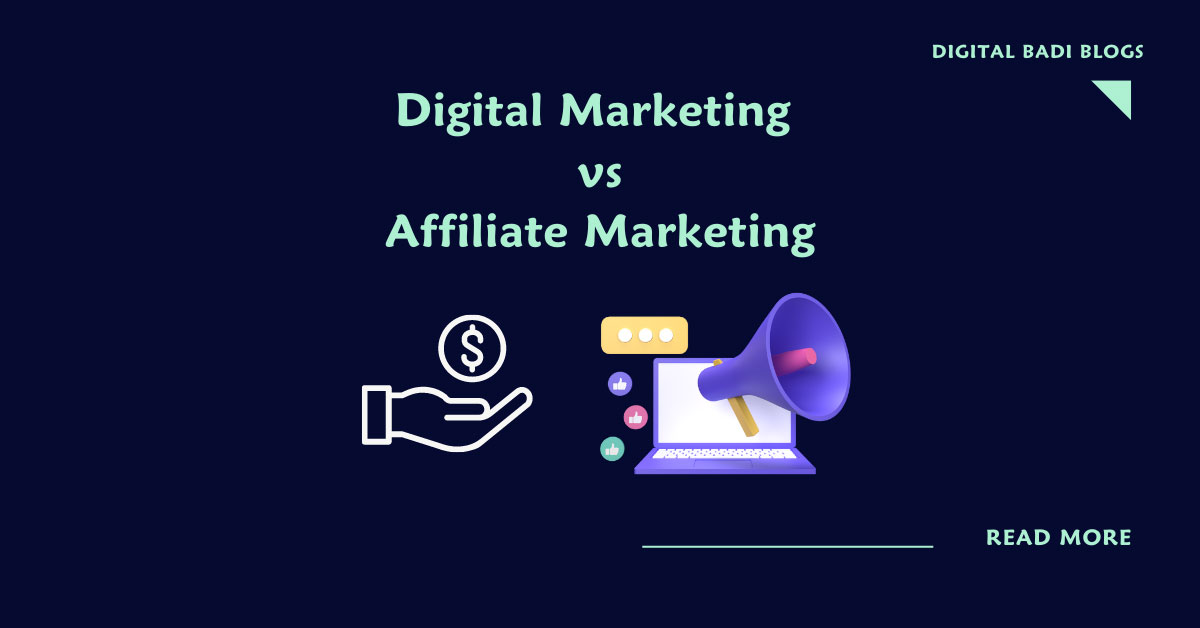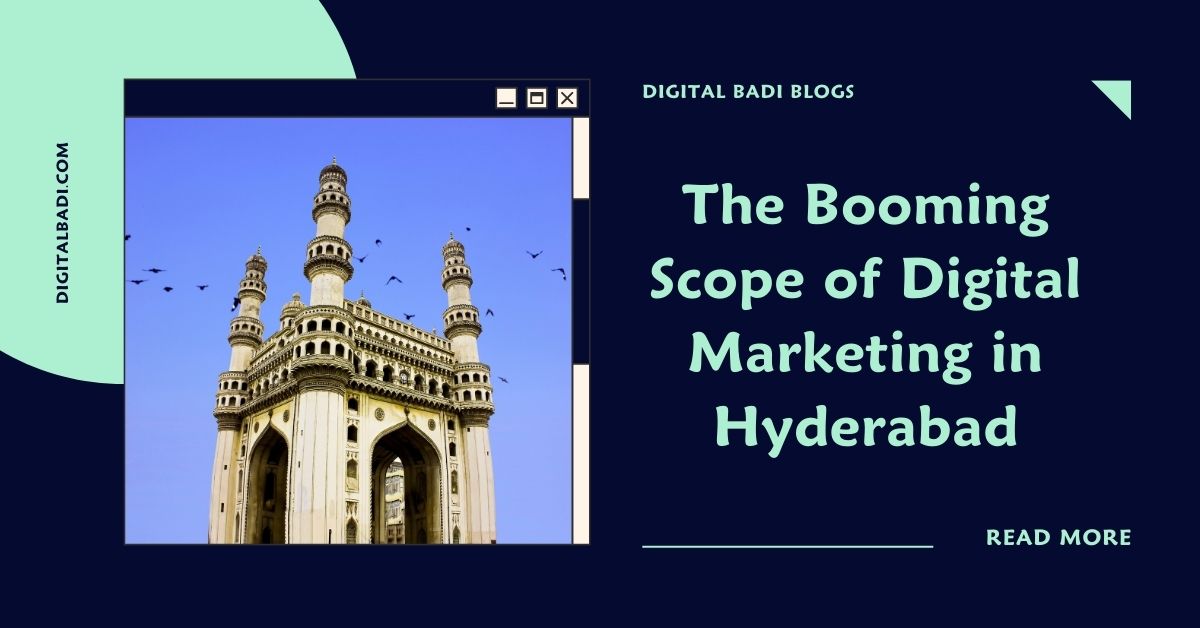Table of Contents
Digital Marketing vs Affiliate Marketing
In today’s online world, digital marketing and affiliate marketing have become two of the most popular ways for businesses to promote their products and services. However, there is often confusion about what exactly these terms mean and how the strategies differ from each other.
As a digital marketing expert with over 10 years of experience, I have worked with numerous clients on both digital marketing and affiliate marketing campaigns. In this post, I will clearly break down the key differences between these two digital strategies to provide clarity on when each one is best suited for your business.
Digital Marketing: A Broad Approach
Digital marketing refers to any online marketing effort by a business to promote its products or services and connect with potential customers. The “digital” part covers all the different forms of online media that a business can use in its marketing strategy, including:
- Websites – A company’s website is often the centerpiece of its digital marketing. Optimizing a site for search engines and creating engaging content are key digital marketing activities.
- Search Engine Optimization (SEO) – SEO involves optimizing web pages and content so they appear higher in search engine results pages (SERPs) for relevant keyword searches.
- Pay-Per-Click (PPC) Ads – PPC advertising allows businesses to promote their site and products by paying to appear as sponsored results in SERPs and on social media. Google Ads and Facebook Ads are two major PPC platforms.
- Social Media Marketing – Using social platforms like Facebook, Instagram, Twitter, and LinkedIn to build brand awareness, engage with customers, and drive website traffic is a core digital marketing strategy.
- Content Marketing – Creating and distributing valuable, relevant content like blog posts, videos, and visual graphics to attract and retain customers is part of a solid digital marketing approach.
- Email Marketing – Sending emails to a subscriber list with promotions, content, and other offers is a cost-effective digital marketing tactic.
- Mobile Marketing – With so much web browsing done on smartphones, having a mobile responsive site and implementing mobile-specific strategies is vital for digital marketing success.
As you can see, digital marketing encompasses a wide array of online strategies and platforms. It provides businesses with many options for promoting and connecting with consumers digitally. The overarching goal is to increase brand visibility, website traffic, leads and sales.
Affiliate Marketing: A Specific Monetization Approach
Now that we have covered the breadth of digital marketing, let’s contrast it with affiliate marketing, which focuses more narrowly on one monetization method.
Affiliate marketing is when a company recruits “affiliates” – typically bloggers, influencers, and website owners – who earn commissions for driving sales to the company’s products or services. The affiliates promote the company’s offerings on their own platforms through special links or promo codes, and earn a percentage of any resulting sales.
For example, John has a cooking blog with a large audience of foodies. The Company ABC recruits John into their affiliate program. John places affiliate links for Company ABC’s new line of kitchen appliances on his cooking site. When a reader of John’s blog clicks the link and completes a purchase on Company ABC’s website, John earns a commission for his referral.
Affiliate marketing creates a performance-based arrangement where the company only pays affiliates when their marketing efforts directly result in a conversion. It allows businesses to extend their marketing reach by leveraging influencers across various platforms.
Some key factors in affiliate marketing include:
- Recruiting Relevant Affiliates – Seeking out affiliates who create content or have audiences closely aligned with your target market.
- Tracking Links and Sales – Using tracking software to provide affiliates with unique links and monitor their resulting website clicks and conversions.
- Commission Structures – Determining how much affiliates earn for different actions like simple clicks vs. purchases or multiple sales.
- Pay-Per-Click or Pay-Per-Sale – Two common commission models – PPC provides payment for clicks and site visits driven by the affiliate, while PPS rewards actual sales.
While affiliate marketing can be very effective when done right, it’s not a comprehensive digital marketing strategy on its own. The affiliate channel is just one marketing tactic, focused solely on driving sales through affiliates rather than broader objectives like brand building.
Key Differences Summarized
Now that we’ve defined both digital marketing and affiliate marketing individually, let’s summarize some of the key differences between the two:
- Goal – The goal of digital marketing is brand awareness and establishing overall presence online. Affiliate marketing has the more defined goal of generating sales and revenue.
- Strategy – Digital marketing uses a wide, multi-channel strategy. Affiliate marketing is a niche monetization tactic under the digital marketing umbrella.
- Owned Media vs. External Publishers – In digital marketing, most efforts focus on owned media properties like a company’s website and social channels. Affiliate marketing relies solely on external affiliate publishers.
- Metrics – Digital marketing metrics are broad and brand-focused, like reach and engagement. Affiliate marketing relies heavily on sales and conversion metrics.
- Established Practice vs. Outsourced Function – Digital marketing is typically handled in-house as a core business function. Affiliate programs are often outsourced to specialized networks to recruit and manage affiliates.
- Audience Targeting – Digital marketing allows companies to directly research, segment, and target their own audiences. Affiliate marketing is limited to the pre-established audiences of the individual affiliates.
When To Use Each Approach
Now that you understand the core differences between digital marketing and affiliate marketing, when should you invest in each?
You should take a broad digital marketing approach if your priorities include:
- Increasing overall brand awareness and recognition
- Establishing thought leadership and credibility
- Engaging directly with your target audiences
- Controlling your brand messaging and UX across channels
- Diversifying your traffic sources to reduce risk
You should invest specifically in affiliate marketing if your focus is on:
- Generating additional revenue from your existing customer base
- Leveraging influencers and content creators to promote products
- Benefiting from publishers’ existing follower bases and traffic
- Achieving scalability through affiliate recruitment
- Adding an outsourced sales channel with minimal in-house effort
For most businesses, the best approach is to utilize both digital marketing strategies together in a comprehensive plan:
- Use core digital marketing to attract customers, boost your brand, and own your audience relationships.
- Incorporate affiliate marketing to monetize your existing traffic and tap into new revenue streams.
This balanced combination results in the best of both worlds – brand building, audience connection, and sales growth. Approaching them together as part of an integrated digital strategy can help maximize your online marketing results and return on investment (ROI).
Final Thoughts
In today’s digital landscape, both digital marketing and affiliate marketing can play important roles in helping businesses connect with customers and generate online revenue.
Digital marketing provides a big picture, multi-channel approach to build brand awareness and loyalty across owned media properties. Affiliate marketing offers a performance-based tactic for monetizing through external publishers and content creators.
While affiliate marketing should not be confused with a complete digital marketing plan, adding it as a supplemental sales channel can benefit brands looking to expand their online reach and increase conversions.
The keys are understanding the core differences between these two terms, knowing when to apply each strategy, and bringing them together cohesively under one digital marketing umbrella. With the right combination of broad brand-building and targeted monetization tactics, businesses can thrive digitally and drive optimal results.






